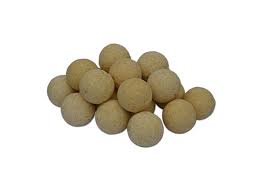What is a Refractory Ball Used For?
Nov 20, 2024Refractory balls are vital components in various high-temperature industrial applications. These spherical refractory materials are specifically engineered to provide durability, resistance to extreme heat, and chemical stability, ensuring efficiency and longevity in industrial processes. Refractory balls are made from high-grade refractory materials such as alumina, silica, and mullite, which are sintered or fired at high temperatures during production. This manufacturing process ensures they can endure intense thermal and mechanical conditions without cracking, melting, or deteriorating.
Refractory balls serve a wide range of purposes in industrial settings, particularly in high-temperature environments. In the petrochemical industry, they are commonly used as catalyst bed support. Refractory balls provide a durable and heat-resistant base layer for catalysts, ensuring stability and efficiency during chemical reactions at elevated temperatures. Their role in this context is critical for maintaining process reliability and achieving optimal performance.
Another significant use of refractory balls is in thermal insulation for furnaces and kilns. Their excellent thermal properties make them ideal for lining the inner walls of these high-temperature facilities. By doing so, refractory balls help maintain consistent temperatures, reduce heat loss, and improve energy efficiency, contributing to operational cost savings. Furthermore, they are widely used in regenerative burners for heat recovery systems, where their thermal storage capacity ensures maximum heat retention. This capability enhances fuel efficiency, reduces energy consumption, and minimizes environmental impact.
In addition to their applications in furnaces and burners, refractory balls are essential in high-temperature filtration systems. They act as robust filters capable of enduring harsh conditions, such as gas filtration in chemical and metallurgical processes. Their ability to withstand corrosive environments and maintain structural integrity makes them indispensable in these demanding applications. Moreover, refractory balls are suitable for load-bearing applications, particularly in rotary kilns and industrial incinerators, where their strength and resistance to wear enable them to support significant mechanical loads.
Refractory balls offer several advantages that make them indispensable in industrial applications. Their high-temperature resistance allows them to withstand conditions up to 1700°C, ensuring reliable performance in extreme heat environments. Their excellent thermal shock resistance prevents cracking or structural failure during sudden temperature fluctuations, making them ideal for dynamic processes. Additionally, refractory balls exhibit exceptional chemical corrosion resistance, which ensures durability in chemically aggressive environments.
Energy efficiency is another key advantage of using refractory balls. Their ability to retain heat and reduce energy loss leads to lower operational costs and improved system performance. Their long lifespan further enhances cost-effectiveness by reducing the frequency of replacements and minimizing maintenance expenses.
Refractory balls come in various compositions and designs to cater to specific industrial needs. High alumina refractory balls are known for their excellent heat resistance and high strength, making them suitable for demanding applications. Silica refractory balls are ideal for thermal insulation purposes, while mullite refractory balls provide a balance between strength and thermal resistance. The choice of refractory ball depends on factors such as operating temperature, mechanical load, and exposure to chemicals.
At DYSen Industrial, we specialize in providing high-quality refractory balls tailored to meet the demanding needs of various industries. Our products are engineered with precision to offer exceptional performance and reliability in challenging conditions. By utilizing high-purity raw materials and advanced production techniques, we ensure that our refractory balls meet the highest quality standards.
Refractory balls find applications across a variety of industries, including petrochemicals, metallurgy, cement production, glass manufacturing, and energy. In petrochemicals, they support catalysts in reactors, while in metallurgy, they serve as filtration media and heat-resistant components. Cement production facilities use them for lining kilns and reducing heat loss, while glass manufacturers rely on them for insulation in high-temperature furnaces. In the energy sector, refractory balls are employed in heat recovery systems and incineration plants, where their thermal retention properties play a crucial role in enhancing efficiency.

Refractory balls are essential materials for industries that require high heat resistance, mechanical durability, and chemical stability. Their versatility and superior performance make them critical components in processes ranging from chemical reactions to heat retention in furnaces. Partnering with a trusted supplier like DYSen ensures access to top-quality refractory balls tailored to your specific industrial needs. By choosing the right refractory solutions, you can enhance efficiency, reduce costs, and achieve long-term operational success.